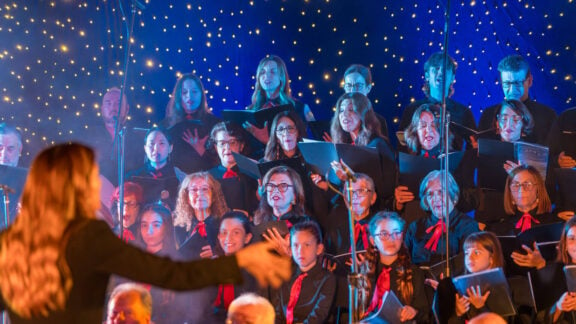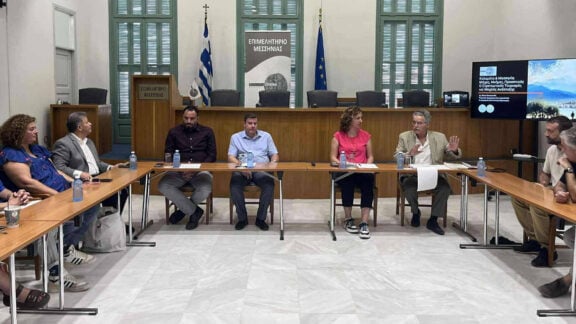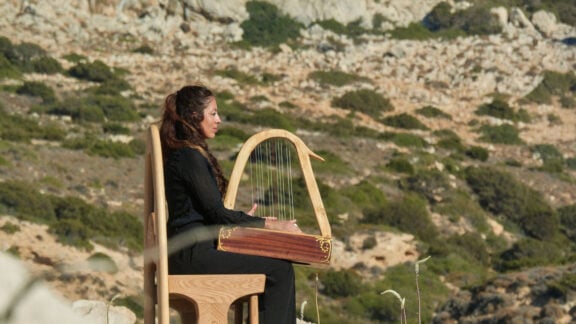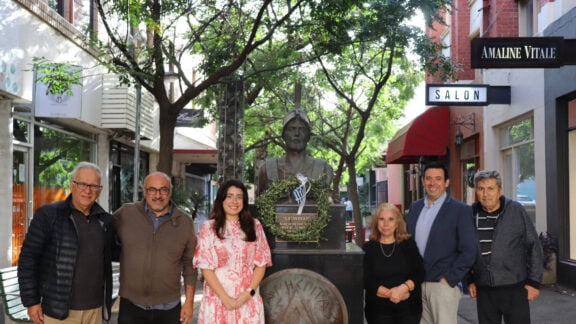Despite advancements in science and technology, throughout different civilisations the question of whether God exists has continued to inspire debate.
Actor Nicholas Papademetriou has grappled with the question himself, and is taking it one step further as he prepares to hit the Reginald Theatre in the role of Austrian psychoanalyst Sigmund Freud in Freud’s Last Session.
Directed by Hailey McQueen, the Cypriot Australian will star alongside Yannick Lawry as British writer and academic C S Lewis. Considered two of the 20th century’s greatest minds, they will be brought together as Britain enters WWII, in a fierce debate over humanity’s biggest questions, including love and sexuality, while centred on Freud’s strong belief that there is no God, and Lewis’ opposing view.
“Freud was brought up in a very strict Jewish family, but he decided in his later 20s that he did not believe, for a number of reasons. He lost a daughter and he lost a grandson, and he was very bitter about that,” Papademetriou tells Neos Kosmos.
“People who are devoutly religious feel that God’s been with them the whole time and suddenly some horrible thing happens and they cannot reconcile their belief with what’s happened, and they can’t understand how God could let them down in that way” – a sentiment the actor understands all too well through personal experience.

Having grown up in a religious Greek Cypriot family, attending Sunday School each week, he says when his father was diagnosed with dementia, a neurodegenerative disease he would come to face for 15 years until his passing three years ago, the actor’s own faith in God was called into question.
“I have to say, I became very disillusioned once my dad’s dementia started,” he reveals.
“My mother of course has remained very devout. She just said ‘I don’t know why it happened; it’s part of God’s plan’. But I don’t see how torturing a man for 15 years is part of God’s plan personally, and as a result of that I drifted away from a more religious lifestyle in my day-to-day.”
Born in Sydney to a working class migrant family, his parents having immigrated from Turkish occupied Morphou in 1948, Papademetriou admits they weren’t taken by the idea of their son pursuing a career in the arts.
“Dad wouldn’t let me act,” he recalls. “That was that generation again, I obeyed my dad, he said you can’t act and I didn’t. I didn’t do anything to do with acting until I left school.”
After completing his HSC, his backup plan was a career in travel, which would take him across the globe, while also putting money in his pocket to pay for his own drama classes.
In 1973 he got his first acting role, but admits his parents never acknowledged it as a proper profession until he went to university in 1982, accepted into an acting degree at WAAPA in Perth.
Aside from appeasing his parents, he says the course did help elevate his profile as an actor, his first role out of uni being a two month guest slot on Sons and Daughters.
While he says he was one of the lucky few to have 10 years of high profile work come his way, he admits they were “difficult years for non-Anglo actors, because you were very typecast”.
Despite starting his career in film and television, it is the theatre that keeps drawing him back, citing the live audience and a chance to improve on his performance each night. But the heart of it runs a little deeper than that.
“The main reason I have to say is because I got offered a lot of, pardon the expression, dumb dago roles for a really long time, and I just wasn’t into it. I was not into Wogs Out Of Work. I thought it was funny, but I didn’t think it did anything for non-Anglo actors, and so I said no to a lot of stuff,” he explains.
Often the roles designated for characters of his ethnic appearance were either shopkeepers, drug dealers, or sleazy types adorned in gold bling. While on the other end of the spectrum, he would miss out on roles he preferred for looking “too ethnic”.
“Like there was a show called Country Practice. I went for the Greek vet and whatever the network was said they really liked my screen test and I had a call back, but they couldn’t take it any further because I looked too Greek, and he was meant to be Greek! They ended up getting a German actor who looked very much like me in a sense that we both had very thick black hair, and a big black moustache, but he had pale skin.”
Papademetriou admits the early years of his career were rather destructive to his sense of identity as a Cypriot Australian.
“For starters they said ‘get a nose job, try and dye your hair a different colour, and stay out of the sun’. And I did get a nose job, I’m very open about it, I did try dying my hair but it looked stupid, and I did try and stay out of the sun but my skin’s very olive as it is, so there’s nothing I could do about it. They said try and change your name – what am I going to change it to? Change it to John Smith and turn up to the audition looking like a Greek person?” he says with a laugh.
In more recent years, the actor says he has observed an interesting shift in the meaning surrounding diversity in Australia when it comes to acting. When a brief cites multiculturalism, he says it no longer includes southern Europeans, but those of Asian, Middle Eastern and Indigenous background, and while he notes this as a move in the right direction for these communities, he says the perception is off.
“There’s some weird perspective about how Greeks and Italians, how European Australians, are assimilated; that we’re actually Aussies. But I don’t think that’s actually true,” he says.
“In fact, I was called a wog on the street in Perth about four years ago while doing a play over there.”
A closer look at Australian film and television continues to lack a strong representation of non-Anglo characters, with true representations of diverse southern European characters who are often in the periphery, rather than centre-stage, as they often are in everyday life.
Papademtriou recalls his very own Freud/Lewis moment, when meeting with a highly successful Greek woman; but rather than God they entered a debate about works such as Wogs Out Of Work, a stage show she, like a number of other Greek Australians, enjoyed.
“I said ‘I’ll leave you with this question: you’re really beautiful, you’re wearing beautiful clothes, you’ve got an office on the top floor of a building at Circular Quay, you’re a partner in a high profile firm, you’ve got this amazing view of the Harbour, and you’re in your middle 40s. When have you seen you on television?’ And she rang me that night and said I’ve been thinking about what you said, and now I’m really angry,” he laughs.
“When have you seen someone who isn’t Effie? Like a highly successful Italian who doesn’t wear crazy clothes, who is not in the kitchen cooking pasta all the time, you don’t see it you know. Occasionally you see it, but not like you see it with usually Anglo characters.”
In a bid to change perceptions, Papademetriou is doing his part. When casting for Oscar Wilde’s The Importance of Being Ernest, he chose a black actress – a controversial move at the time, which he pursued despite the push back.
“They said how is it going to work? And I said ‘well how does it work when Cate Blanchet plays an Italian woman?’ Which she has on a number of occasions; how does that work? And then they go ‘oh I see what you mean’. It’s a double standard in some respects,” he explains.
While Papademetriou has had a long career, having worked both in Australia and overseas, at 65 the diversity issue still looms quite large for him, still conditioned himself, to what people think.
“When I go for auditions sometimes, I usually say ‘you sure you want a Greek to do this role?’ Even in this play, in his pictures he’s a pale skinned German, so I’m not going to look like the traditional idea of Freud.”
A fitting decision from the casting manager’s part, and one we can only assume Freud would appreciate. After all he was progressive for his time.
‘Freud’s Last Session’ will be staged at the Seymour Centre from 10 October until 10 November.








